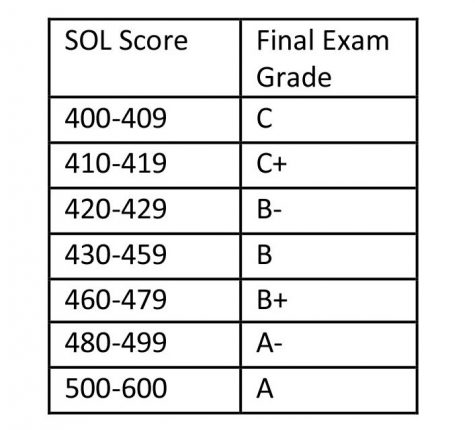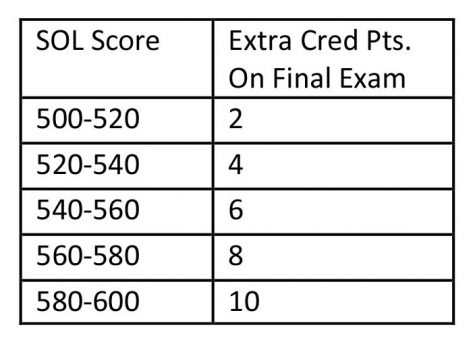New SOL policy impacts final exams


As SOLs approach, a new policy has been released. Students taking non-honors courses that require an SOL now have that option to sit out for their final exam and take the grade that corresponds with their SOL score, if they pass. However, honors and IB students are still required to take both the SOL and the final exam because the grade they get on the final exam will impact their GPA.
With the new policy, non-honors students can use their SOL scores as their final exam grade if they think that the score represents their best ability. Once the student receives their SOL score they can choose whether or not they want to keep the grade that corresponds with the score they earned or take the final exam to try to earn a higher grade. If the student fails their SOL it will not penalize their grade at all.
If a student decides to take the final exam, their teacher must then use the higher of the two scores as the final exam grade.
“I like this new policy because final exams are the exact same thing as SOLs, with this new policy it will definitely save me some stress and tears,” sophomore Han Gyul Chang said.
This new policy will only apply to students who take and pass the SOL in the same examining year.
“I feel like this is a great idea because it will motivate me to push myself further to try to get a better score,” junior Hao Quach said.
As for Honors students, they will have the opportunity to receive extra credit on their final exam depending on the SOL score they earn.
Teachers hope that the new policy will encourage students to take the SOL exam more seriously and put in the most effort that they can to get a better score, on both the SOL and the final exam.
Even with the new Incentive Policy others still question the value of SOLs and wonder if all of the hard work that goes into them is still worth it. Teachers and students both agree that there are both pros and cons that come along with SOLs.
“One positive is SOLs provide an objective baseline to compare to other test as of the same type to measure the student’s progress or lack thereof in memorizing facts,” history teacher Stratton Shartel said.
“Another favorable thing about SOLs is they paint a clear, black and white picture of what students should know when they leave the class. If a student can pass an SOL in my class for example, theoretically they have mastered World History II,” history teacher Ashley Senior said.
Others find SOLs to be a great way to provide a standard for all schools to ensure all students in the county get the same basic education.
“This is a benefit to our society overall,” biology teacher Richard Ford said.
For students who are planning on going to college the standardized testing can be seen as a great way to practice and prepare for future college entrance examinations. Even for those not planning on college, it ensures a minimum level of education that will greatly benefit that person later in life.
On the flip side there are some negatives that come along with taking SOLs.
SOLs are not as good at measuring students higher-order thinking or skills such as writing, presentation skills, and creative thinking to solve problems. Students are only focused on filling in a circle rather than writing down thoughtful answers.
“Kids need different ways to express what they have learned,” Shartel said.
Another con to taking SOLs is they cause so much stress and provide so much pressure for both students and teachers to show improvement in the SOL scores.
“We are able to do less creative teaching for fear of not covering everything on the SOL and our students not passing,” Senior said.
SOLs can also be seen as a disadvantage for students that learn better from different teaching styles. For example some students know the information, but have low literacy, or weak test taking skills, these students have a severe disadvantage especially if their credit for the class rides on passing a pencil and paper standardized test.
Teaching the standardized testing material can also be very boring and less engaging for many students. Forcing teachers to stick to the required SOL material can potentially cause teachers to neglect other important aspects of learning.
“In my non-SOL class I am able to do more projects, and spend more time on subjects my students find interesting because there is no timeline on when I need to finish my material for a state run test,” Senior said.
Students also find SOLs to be an unnecessary extra work load added to the end of the year.
“I think finals are enough, with SOLs we don’t fully concentrate on the finals and end up being a lot more stressed,” sophomore Johanna Huarachi said.
Whether teachers believe that SOLs are unneeded and take a lot of fun out of the classroom, or find them to be a very good way to provide a basic education for students all over the county, students are required to and will continue to take them this year and most likely in the following years.

Senior Jessica Salisbury is currently the Photography editor for the A-Blast. This is her fourth year on the staff. She also spends a lot of her time playing...







